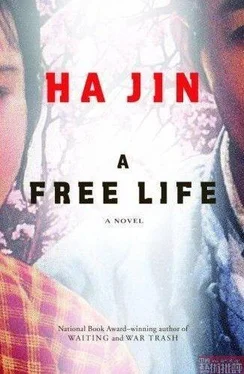"Hard to say. Probably two hundred thousand."
"What?" cried Bao.
"Just a guess. A Japanese car like this can run forever."
The car jolted along as if running on cobblestones. Despite the bumpy ride, Nan soon turned thoughtful. Mr. Liu had formerly lived a privileged life, having his own chauffeur and secretary, but now he had to restart his life here, writing for newspapers and magazines like a hack and even ready to do menial work. Still, he seemed quite buoyant and didn't regret his exile at all. Nan was full of both sadness and respect.
At last they arrived at the Nostrand Avenue station. Even though he had stepped out of the car, Nan still couldn't shake off the jitters. "It's a real experience," he told Mr. Liu.
" Next time I can drive you all the way home," the old man said with a broad grin that revealed his tobacco-stained teeth.
"Take good care, Mr. Liu," said Bao.
"You too, young men."
They saw the jalopy roll away, dragging a tail of exhaust, and merge into the flow of the traffic. They turned and entered the station to catch the train. Nan asked his friend about Mr. Liu, "Doesn't he often say he'll return to China?"
"Yes, but he must have realized that would be impossible in the near future. That's why he has been learning how to support himself."
"He's a remarkable man."
"And also an interesting character."
Nan was annoyed by Bao's flippancy but said no more. They parted company to take different trains, Nan going downtown while Bao headed back. All the way to work, Nan ruminated on their meeting with Mr. Liu, who, unlike himself, didn't show any bitterness about his truncated life, as if he were oblivious to all the evil he had suffered. How different the old man was from some Chinese dissidents who were well supported by universities and foundations. On the other hand, Nan was upset too, for he felt a man such as Mr. Liu couldn't possibly live decently in this land because he was too old to start anew. However hard he struggled to be independent, Mr. Liu would still belong to their native land, and his existence would still be shaped by the Chinese political center of which he had always been a part. The very fact that he thought of doing those odd jobs indicated that he didn't plan to stay in America for long. Perhaps at night he couldn't help but dream of his former life.
Unlike him, if Nan lived his type of life and drove that kind of car, he'd earn only contempt and ridicule. He had to find his own way here, living not as an expatriate or an exile but as an immigrant. He was still young and must put up a fight. If only he could figure out where his battlefield was.
UNLIKE NAN, Bao didn't work and had been writing his memoir, which he said might bring him fame and fortune once it was published. That was why he didn't edit the journal himself and had hired Nan to do it. He seemed determined to live an artist's life, concentrating on his writing and painting. In his studio, the room opposite Nan's in the attic, several unfinished gouaches leaned against the walls, and Bao told Nan that he had been experimenting with new techniques, including painting with fingers or with a palette knife. Whenever others asked him what he did for a living, he'd say, "I paint and write." In a sense Nan admired that, though at the same time he could see that Bao had been using Wendy.
What's worse, Bao was an alcoholic. He often came to Nan's room with a bottle of cheap wine and wanted to share it with Nan, but Nan usually declined. Bao seemed lonely, unable to speak with anyone during the day when Wendy would go out to meet friends or participate in community activities. After half a bottle of wine, he'd grow loquacious, but would slur his words so much that Nan couldn't always follow him. He'd talk about whatever came to mind. He described how at the age of nine he had pilfered money from his parents and bought candies and Popsicles for his pals, and how he and a bunch of urchins had stolen into an orchard, eating their fill of fruits and melons. Once when he was tipsy, he even bragged about how firm Wendy's breasts were because she had never suckled a baby, and how tight her vagina was since she hadn't given birth. Another time he confided that he'd had a crush on the young Chinese woman who had been the managing editor before Nan. One night he took offense at Nan 's refusing to down the California Chardonnay he had poured for him. "If you want to write poetry, you have to be fond of drinks, like Li Po, the Wine God," he told Nan. But Nan would have to read submissions the next morning before going to work and couldn't afford to get drunk. Besides, he didn't believe alcohol was a source of inspiration and could induce poetic spontaneity. To his mind, that was a mere excuse for would-be writers to indulge themselves.
One day Bao showed Nan a chapter of his memoir, nineteen handwritten pages, and asked him to read it. It was about how his father, a high school chemistry teacher, had been forced to collect night soil in their rural town and pull a trash cart on the streets at the beginning of the Cultural Revolution. Because of his father's disgrace, Bao, besides taking verbal insults every day, was often beaten by his schoolmates. The writing was rough, and the story too generic and too expository. As a result, the experiences remained opaque and dull, not substantiated by concrete details. After reading it, Nan told Bao, "I don't think this is finished yet. You should make it fresher and more peculiar if not surprising."
"Heaven knows how hard I worked on it."
Then, to Nan 's surprise, Bao asked him to translate this chapter so that New Lines could print it. Grudgingly Nan agreed. The translation bored him and took him a whole week to finish. When working on it, he'd swear and slap his forehead as if he had been swindled. He'd rather dig ditches with a shovel than wrestle with this florid prose marred with cliches and clever but superficial jibes. How relieved he felt when he was finally done.
On seeing the pages in English, Bao turned ecstatic and even bowed to Nan, saying he owed him a dinner. He looked at the translation over and over, though hardly able to understand it. But Wendy read it and told Nan that she was impressed by his way of using English, which was fluid, elegant, and slightly old-fashioned, but suited the subject well.
These days Bao often said to Nan that he was terribly homesick. He even wondered if he should go back to visit his parents, though he didn't have the money for the airfare and for the gifts for his family and friends. Nan admonished him to forget about that, because Bao was known as a dissident, already blacklisted, and would be either refused entry or apprehended by the police at China 's customs. "It's not worth running the risk," said Nan.
"If only I were naturalized," Bao sighed.
"What difference would that make?"
"The Chinese police won't hurt you if you're an American citizen. Have you heard of Weifu Cai?"
"Yes, wasn't he arrested last time when he attempted to enter China?"
"Yes, but they released him a month later. He just got a huge grant from an American human rights foundation, thirty thousand dollars in total. See, he held a U.S. passport, so the Chinese government couldn't really harm him. Otherwise they could've sentenced him to five years at least."
"I didn't know he was back."
" I saw him a couple of weeks ago. He was a picture of health. If only I were an American citizen." "Then you'd try to go back?" "Definitely."
Nan remembered a saying popular in the Chinese diaspora: "Only by becoming a citizen of another country can you be treated decently by the Chinese."
AT DING'S DUMPLINGS, the waitstaff judged customers mainly by how much they tipped. Aimin and Maiyu often complained that some Americans were too demanding and too grouchy, and that if this restaurant had been Italian or French, they wouldn't have been so surly. "They come here only because they're cheap," Aimin said, and bunched up her thin lips. "Or we're cheap," Maiyu added.
Читать дальше












